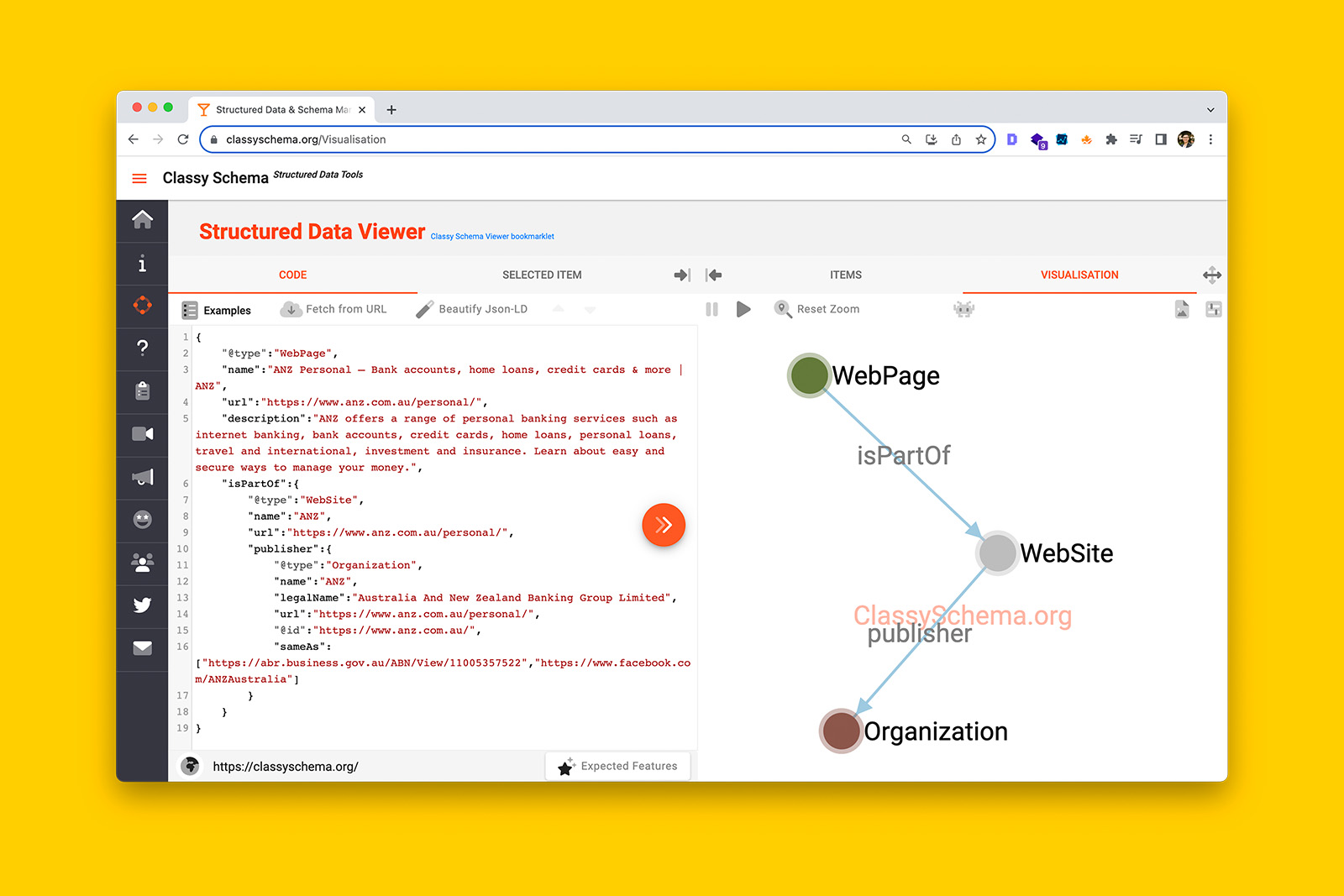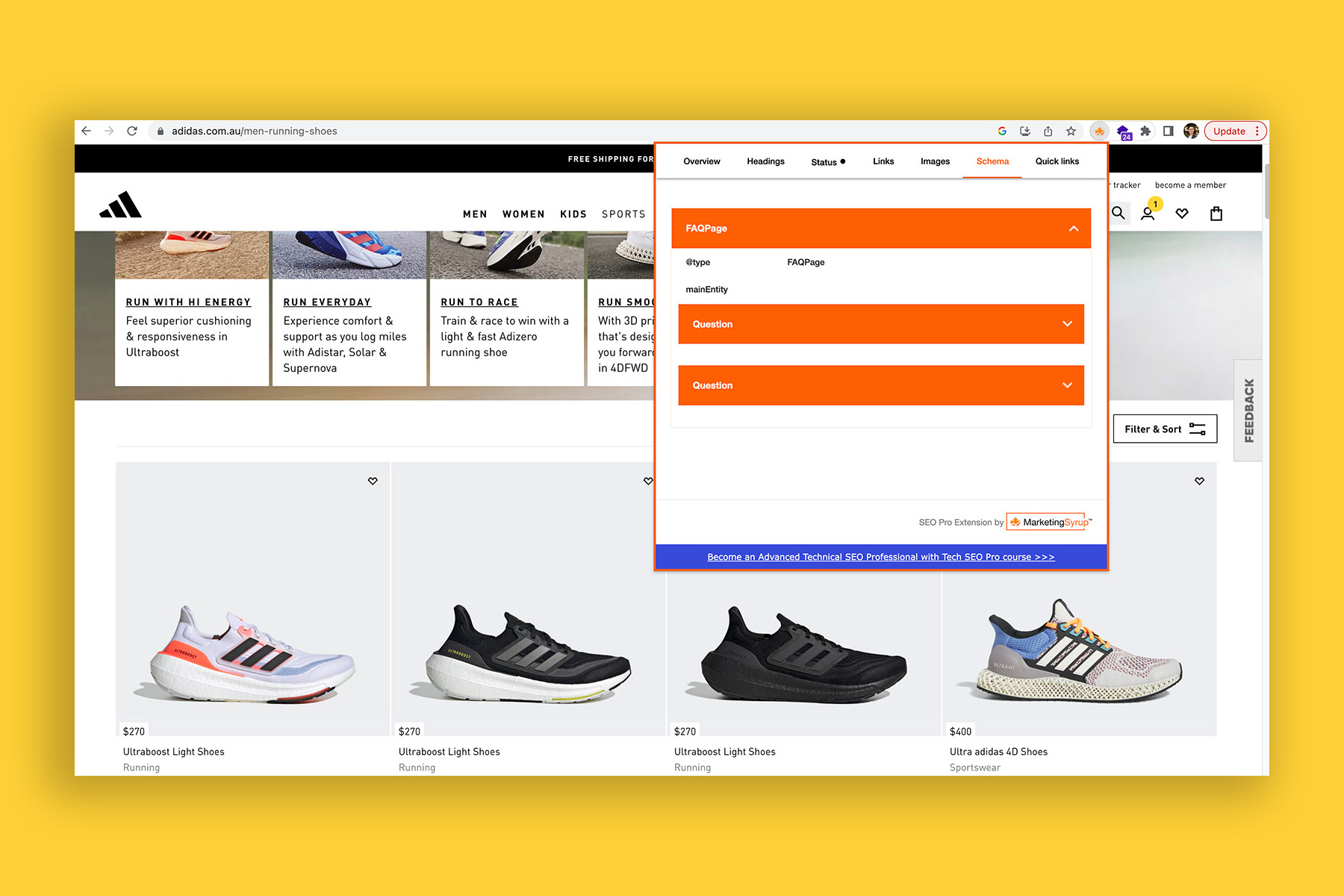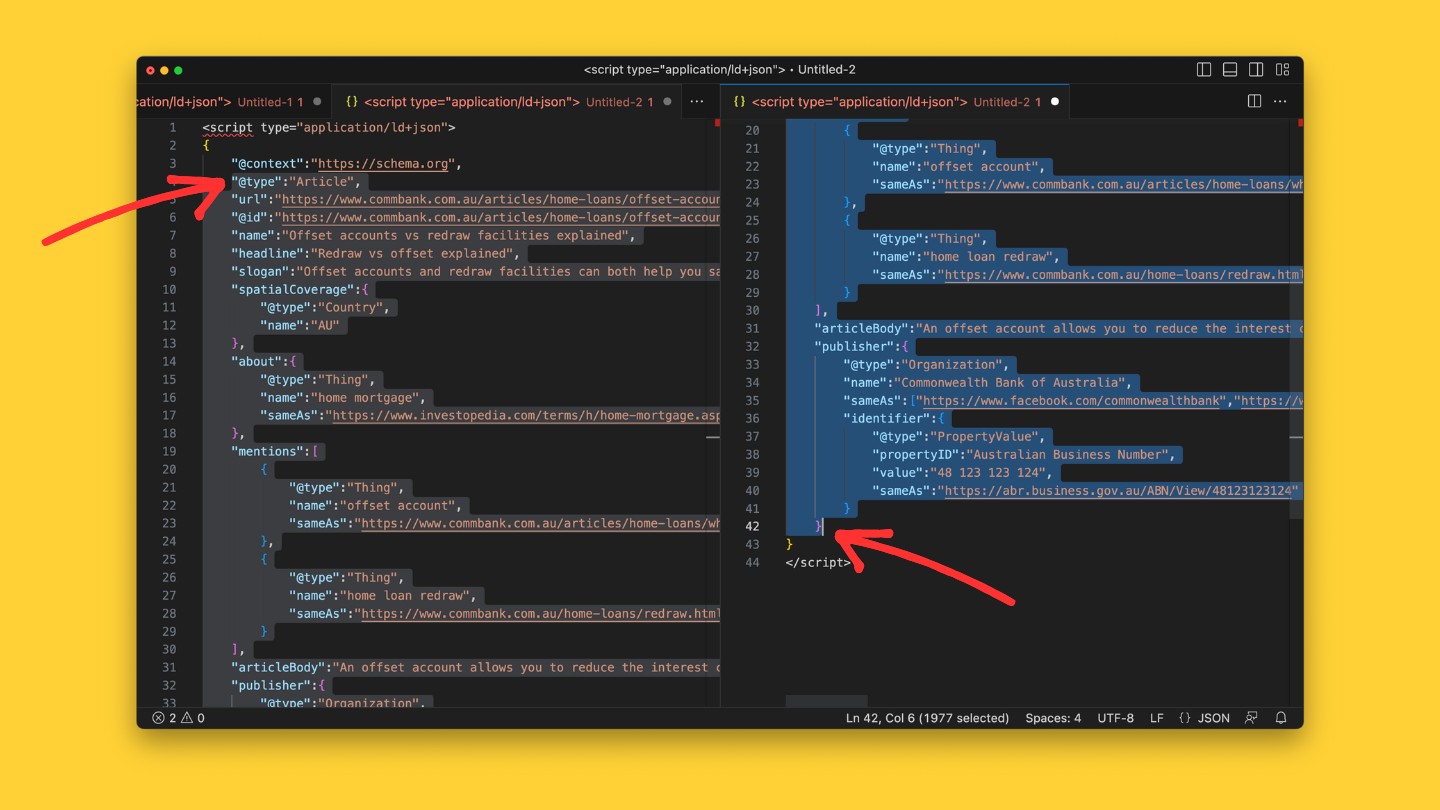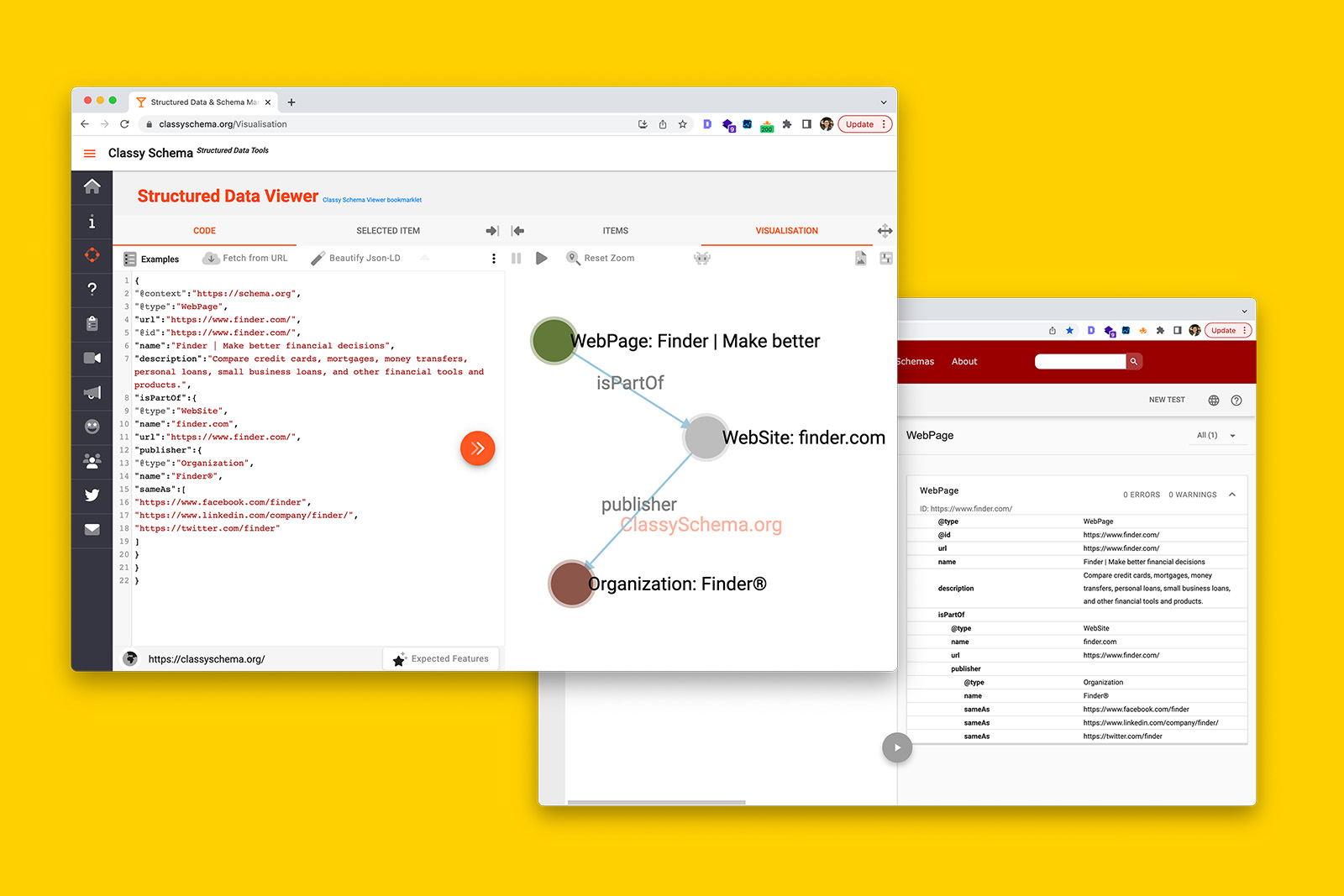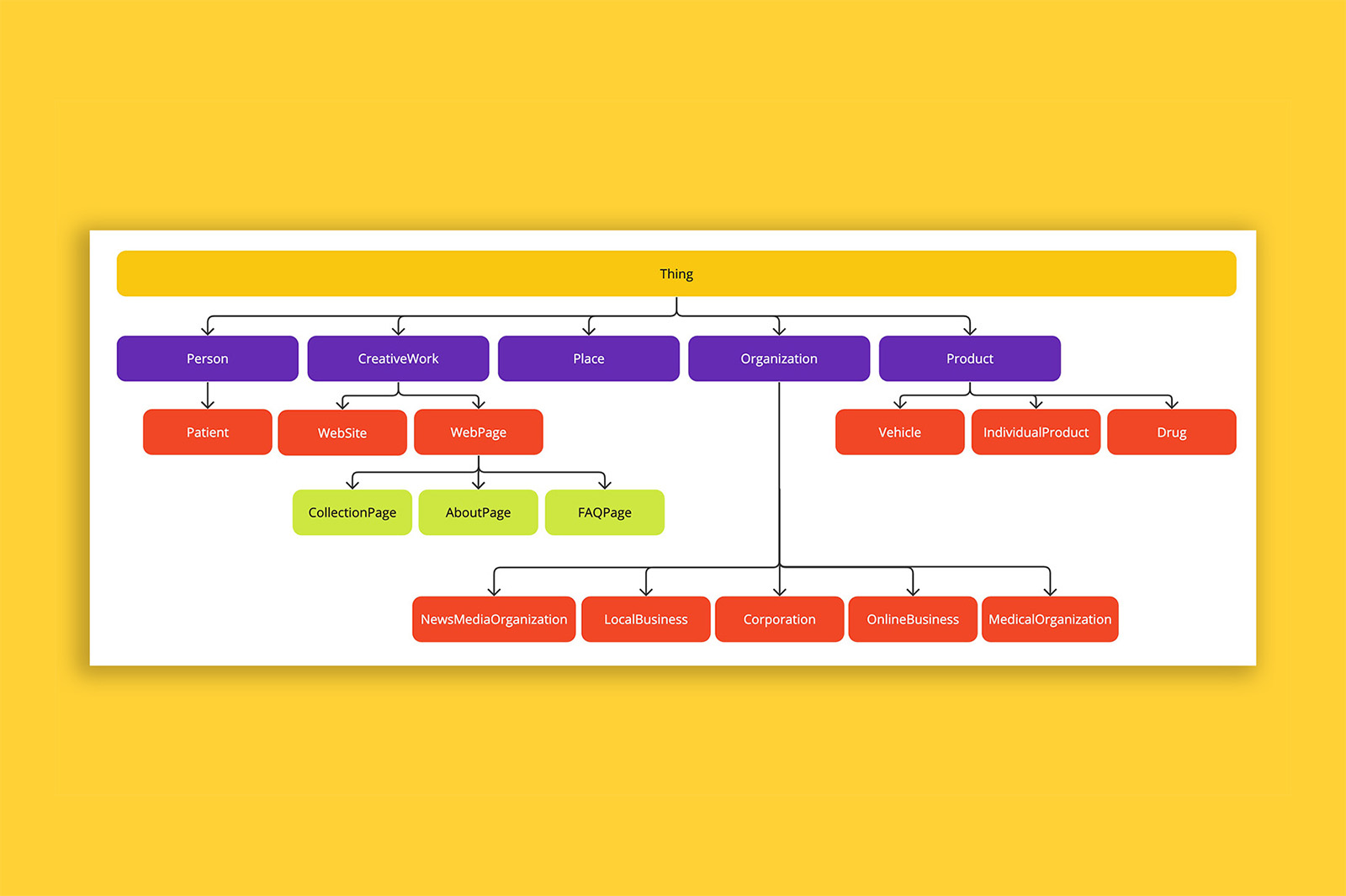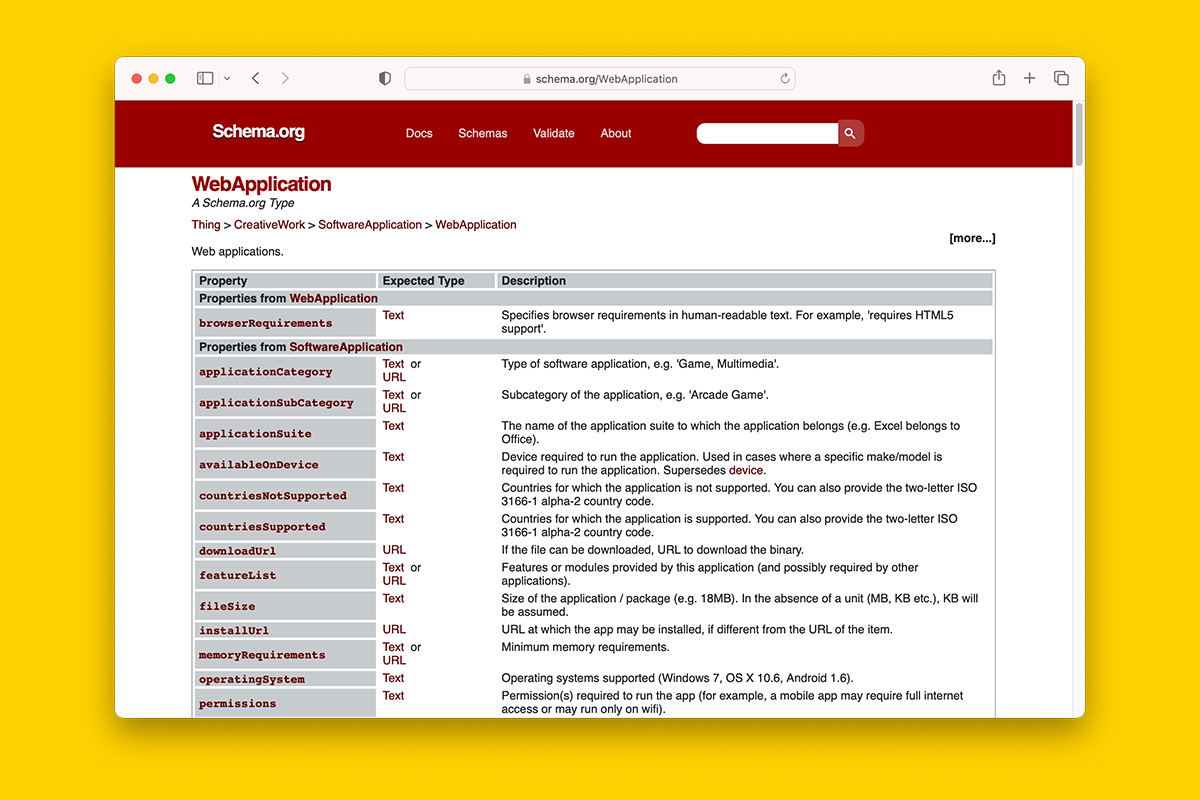How to use Organization schema correctly to its fullest potential
Key takeaways:
- Any registered entity can use Organization Type as defined by Schema.org.
- Using this schema Type lets you define explicity what a business, brand, or not-for-profit is to a search engine.
- Organization schema markup can exist on each page but it should be used to establish credibility of the content, and;
- You should reserve the full description of the entity on its entity home (e.g., company about page).
- This means that on all other instances of Organization schema should use a condensed version.
What is Organization schema?
Organization schema is a form of structured data used to mark up information about an organization on a webpage.
This can include information about the organisation’s, name, legal name, physical location(s), contact information, as well as details about the organisation’s leadership, products or services, and affiliations.
Organization Type can be used on all types of businesses from one person sole trader to a multi-national corporation with thousands of employees.
Organization schema can also be applied to not-for-profits, recreational clubs, political groups, unions, and educational institutions.
What does Organization schema JSON-LD look like?
In its most basic form, Organization schema is defined using the @context property to reference schema.org’s vocabulary. Then to indicate the type of entity being defined, the schema.org Type property is used as shown:
"@context":"https://schema.org",
"@type":"Organization"But there are many subtypes of business types such as:
- LocalBusiness
- OnlineBusiness
- SportsOrganization
- NewsMediaOrganization
- Corporation
- EducationalOrganization
- GovernmentOrganization
- MedicalOrganization
For example:
"@context":"https://schema.org",
"@type":"LocalBusiness""@context":"https://schema.org",
"@type":"OnlineBusiness""@context":"https://schema.org",
"@type":"MedicalOrganization"As you can see, instead of using Organization, the @type is set to the corresponding entity type (i.e., a local business, an online business, or a medical-related business).
Can I use Organization schema if I’m not a company?
Yes you can. In fact, any website that represents a business or registered organisation should use Organization schema.
Organization schema should be used to describe any of the following:
- a sole trader or sole proprietor (or freelancer registered as a sole trader) who offers a service
- a business partnership
- a registered not-for-profit or charitable organisation
- a brick and mortar store that customers visit
- an ecommerce store with no physical location
- an ecommerce store with retail locations and an office headquarter
- a large corporation
- an online publisher of media content
- an educational institution or business (e.g., high school, preschool, elementary school, university).
Should I use localBusiness, onlineBusiness, or Organization schema?
LocalBusiness, OnlineBusiness, MedicalOrganization are specific types of Organization schema. They should only be used if the entity you are describing is best described using one of these Types.
Certain properties that are valid for Organization schema are invalid for LocalBusiness and OnlineBusiness and this is why it is important to use the most accurate entity type.
These include:
- areaServed: unfortunately this property cannot be used to describe the geographical areas served by a local business or online business.
- foundingDate and foundingLocation
- member
- subOrganization
Should Organization schema exist on every webpage?
No, Organization schema does not need to be on every webpage.
Schema markup should be reserved for important webpages as search engines are pretty good at understand the content found on a webpage.
Some people reserve Organization schema for the homepage, about page, and contact page. In my opinion, this is incorrect because structured data is a fool-proof and literal way to tell a search engine what is on a webpage.
Most SEOs will markup an entire page as being an organisation – this is incorrect.
The best way to include information about the website and the brand that is behind it is through nested schema.
What this means is instead of having a webpage marked up as an organization, such as:
{
"@context":"https://schema.org",
"@type":"Organization",
"name":"Example Company Pty Ltd",
"url":"https://www.example.co"
}You tell a search engine that a webpage is part of a website that is part of by an organisation by doing the following:
{
"@context":"https://schema.org",
"@type":"AboutPage",
"name":"Example Company",
"url":"https://www.example.co/about-us/",
"mainEntity":{
"@type":"Organization",
"name":"Example Company Pty Ltd",
"@id":"https://www.example.co/#organization"
}
}
When should Organization schema markup be used?
I recommend the following instances:
- About page: The about page for any brand should be used as its entity home. That is, you nest Organization Type within AboutPage Type.
- Homepage: The homepage of a website is one of its most trafficked pages by people and search engine crawlers. Therefore, it makes sense to tell search engines that the homepage’s main entity is the Organization Type.
- SEO content pages: For any brand that publishes content to bring people into their marketing funnel, setting the Organization as the author of the content will give the content credibility.
This is because almost any page on a website can reference Organization. But not every webpage needs structured data and not every page on a website needs to have Organization schema.
Organization schema properties you should use
Schema.org has a full list of properties you can use to describe various aspects of an organization.
These are the properties I use the most for Organization schema:
- name
- alternateName
- legalName
- sameAs
- taxID or vatID
- url
- address
- knowsAbout
- hasMerchantReturnPolicy
- department
- founder
- hasOfferCatalog
- parentOrganization
But you can use any of the properties you’ll find on Schema.org.
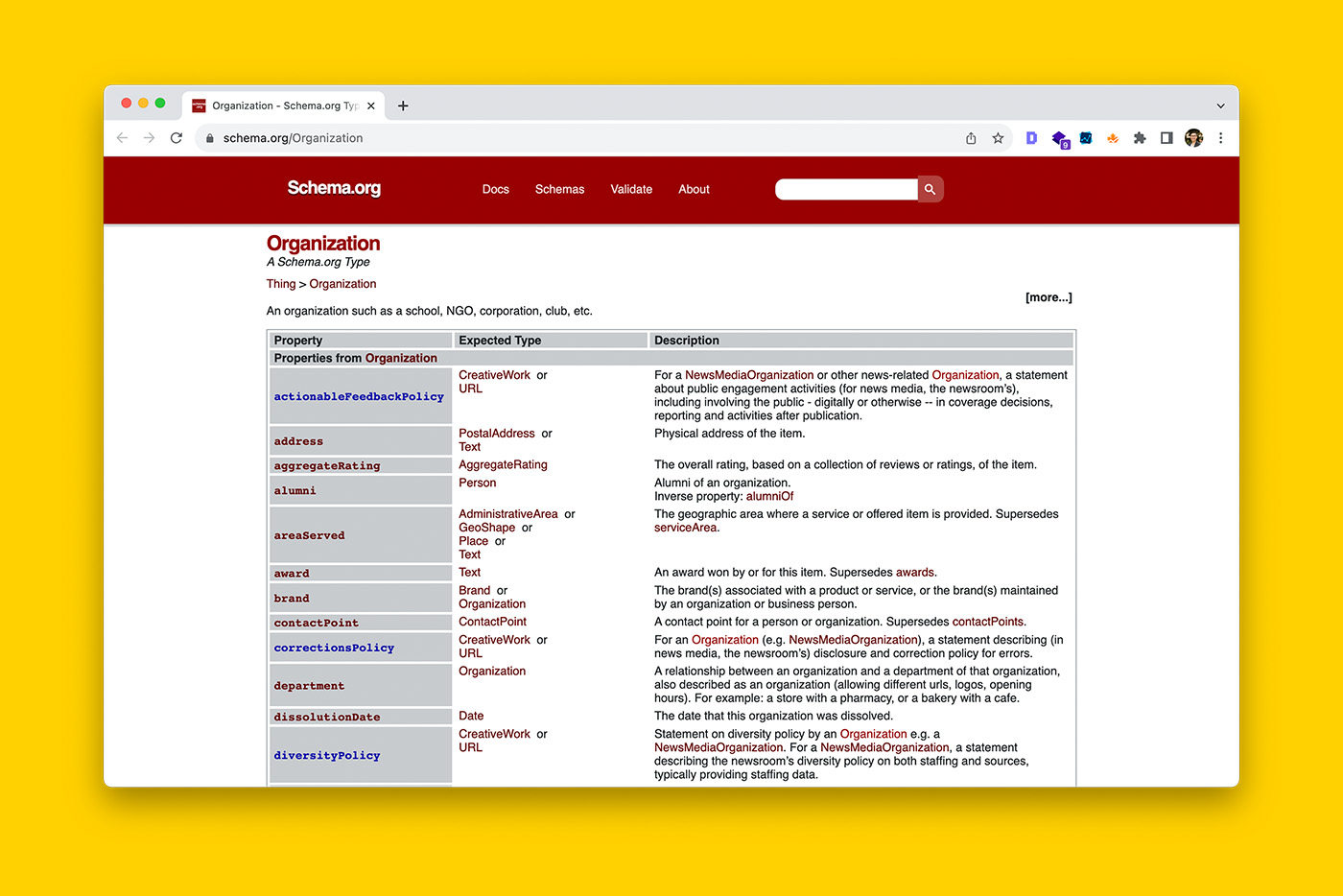
Organization schema examples
To help you get started, you will find a range of JSON-LD markup describing real-world organisations of varying types.
1. A freelance writer registered as a sole trader
In this example, I found a freelance copywriter and using public information, built the following structured data markup for Caitlin Wright.
<script type="application/ld+json">
{
"@context":"https://schema.org",
"@type":"Organization",
"name":"Caitlin Wright",
"url":"https://caitlinwright.com.au",
"@id":"https://caitlinwright.com.au/#organization",
"description":"I'm an award winning website copywriter, freelance journalist and online editor. I have spent my career working for companies like 7News, Skype and Medical Journal of Australia.",
"founder":{
"@type":"Person",
"name":"Caitlin Wright",
"sameAs":[
"https://www.linkedin.com/in/wrightcaitlin/",
"https://instagram.com/caitlinjwright",
"https://twitter.com/caitliniswright"
],
"image":{
"@type":"ImageObject",
"url":"https://caitlinwright.com.au/wp-content/uploads/2021/11/caitlinwright-contact.png"
},
"knowsAbout":[
{
"@type":"DefinedTerm",
"name":"copywriting",
"@id":"https://www.wikidata.org/wiki/Q624896"
},
{
"@type":"DefinedTerm",
"name":"journalism",
"@id":"https://www.wikidata.org/wiki/Q11030"
}
]
},
"email":"[email protected]",
"telephone":"61401236466"
}
</script>You’ll notice that I have nested Person schema within Organization schema.
The reason why I chose to use the broad Organization schema was because Caitlin didn’t have a Google Business Profile. Therefore, it didn’t make sense to use the LocalBusiness sub-type schema. Similarly, since her copywriting business is solely built in her personal brand, it made sense to reference her as an individual in the JSON-LD.
2. An ecommerce store with no physical location
Pet Circle is an online-only ecommerce store. Therefore, in this example, I will use the OnlineBusiness schema sub-type.
<script type="application/ld+json">
{
"@context":"https://schema.org",
"@type":"OnlineBusiness",
"name":"Pet Circle",
"legalName":"Millell Pty Ltd",
"description":"Pet Circle is Australia's largest online pet shop. We're focused on bettering the lives of pets and pet parents alike! We're here to make shopping for pet supplies as easy and convenient as possible. There's a reason over 700,000 pet parents trust us - we're committed to providing awesome customer service, fast shipping, and free, personalised advice from Pet Circle's online vet team! We also support our community by donating food and supplies to more than 100 animal rescue organisations. We stock a great range of animal supplies for your pet's well-being including: dog harnesses, collars, toys, treats, dog beds, dog crates, cat litter and cat flea collars. Everything from cat carriers, right through to dog nail clippers to care for your pets. We've got speciality species covered too! We stock a wide range of fish tanks and aquariums, air pumps, bird cages, bird supplies, reptile, rabbit and horse products. Pet Circle also offers the best vet products online such as flea, tick and worming treatments from leading brands like: NexGard Spectra, Simparica Trio, Bravecto, Sentinel and Revolution Plus. As well as vet diets from Hill's Prescription Diet and Royal Canin Vet Diet. Let's Pet Better, together!",
"url":"https://www.petcircle.com.au",
"@id":"https://www.petcircle.com.au/#organization",
"areaServed":{
"@type":"Country",
"name":"Australia"
},
"sameAs":[
"https://www.facebook.com/petcircle.aus",
"https://instagram.com/petcircle?ref=badge",
"https://www.youtube.com/user/petcircleau",
"https://www.linkedin.com/company/petcircle/"
],
"hasMerchantReturnPolicy":{
"@type":"MerchantReturnPolicy",
"applicableCountry":"AU",
"merchantReturnLink":"https://www.petcircle.com.au/returns-policy"
},
"ethicsPolicy":"https://www.petcircle.com.au/petcircle-assets/content/static-pages-policy/Pet_Circle_Whistle_Blower_Policy_2023.pdf"
}
</script>3. A large corporation
Boston Consulting Group, Inc. is a multi-national consulting firm. In this instance, the JSON-LD describes the main entity using the Corporation organization sub-type, references the offical logo of the company and associates social media handles with the entity.
<script type="application/ld+json">
{
"@context":"https://schema.org",
"@type":"Corporation",
"@id":"https://www.bcg.com/#corporation",
"name":"Boston Consulting Group",
"description":"Boston Consulting Group is a global consulting firm that partners with leaders in business and society to tackle their most important challenges and capture their greatest opportunities. Our success depends on a spirit of deep collaboration and a global community of diverse individuals determined to make the world and each other better every day.",
"url":"https://www.bcg.com",
"logo":{
"@type":"ImageObject",
"url":"https://web-assets.bcg.com/dims4/default/2493c6b/2147483647/strip/true/crop/746x501+0+0/resize/1492x1002!/format/webp/quality/90/?url=http%3A%2F%2Fboston-consulting-group-brightspot.s3.amazonaws.com%2F65%2F46%2Fd6769bfd46abd4021e2c6727f508%2Fbcg-monogram-rgb-green-tcm9-210235.png"
},
"sameAs":[
"https://www.linkedin.com/company/boston-consulting-group",
{
"@context":"https://schema.org",
"@type":"Corporation",
"@id":"https://www.bcg.com/#corporation",
"name":"Boston Consulting Group",
"description":"Boston Consulting Group is a global consulting firm that partners with leaders in business and society to tackle their most important challenges and capture their greatest opportunities. Our success depends on a spirit of deep collaboration and a global community of diverse individuals determined to make the world and each other better every day.",
"url":"https://www.bcg.com",
"logo":{
"@type":"ImageObject",
"url":"https://web-assets.bcg.com/dims4/default/2493c6b/2147483647/strip/true/crop/746x501+0+0/resize/1492x1002!/format/webp/quality/90/?url=http%3A%2F%2Fboston-consulting-group-brightspot.s3.amazonaws.com%2F65%2F46%2Fd6769bfd46abd4021e2c6727f508%2Fbcg-monogram-rgb-green-tcm9-210235.png"
},
"sameAs":[
"https://www.linkedin.com/company/boston-consulting-group",
"https://www.facebook.com/BostonConsultingGroup",
"https://twitter.com/BCG",
"https://www.youtube.com/user/TheBCGVideo"
],
"department":[
{
"@type":"Organization",
"name":"BCG in Africa",
"url":"https://www.bcg.com/offices/cairo",
"@id":"https://www.bcg.com/offices/cairo/#organization",
"address":{
"@type":"PostalAddress",
"streetAddress":"F4, First Floor, Building H, 5! by Waterway",
"addressLocality":"New Cairo",
"addressRegion":"Cairo",
"addressCountry":"Egypt"
}
},
{
"@type":"Organization",
"name":"BCG in Miami",
"url":"https://www.bcg.com/offices/miami/default",
"@id":"https://www.bcg.com/offices/miami/default/#organization",
"address":{
"@type":"PostalAddress",
"streetAddress":"1450 Brickell Avenue, 34th Floor",
"addressLocality":"Miami",
"addressRegion":"Florida",
"addressCountry":"United States"
}
},
{
"@type":"Organization",
"name":"BCG in Sydney",
"url":"https://www.bcg.com/offices/sydney/default",
"@id":"https://www.bcg.com/offices/sydney/default/#organization",
"address":{
"@type":"PostalAddress",
"streetAddress":"Level 26, 60 Martin Place",
"addressLocality":"Sydney",
"addressRegion":"NSW",
"addressCountry":"Australia"
},
"telephone":"61293235600",
"contactPoint":{
"@type":"contactPoint",
"contactType":"Office Administrator",
"name":"Chris Mattey",
"url":"https://www.bcg.com/about/people/experts/chris-mattey",
"sameAs":"https://www.linkedin.com/in/chris-mattey-193aa81/"
}
}
],
"knowsAbout":[
{
"@type":"DefinedTerm",
"name":"business strategy",
"@id":"https://www.wikidata.org/wiki/Q20014942"
},
{
"@type":"DefinedTerm",
"name":"business transformation",
"@id":"https://www.wikidata.org/wiki/Q5001958"
},
{
"@type":"DefinedTerm",
"name":"corporate finance",
"@id":"https://www.wikidata.org/wiki/Q1134763"
}
],
"founder":{
"@type":"Person",
"name":"Bruce Henderson"
}
}</script>Using public information, I have referenced:
- 3 core capabilities using the DefinedTerm property
- who the founder of BCG is
- 3 offices around the world using the department property
- a point of contact for the Sydney location as per their webpage
4. A national online publisher of media content with geo-locational subfolders and brands
In this example, I am describing Sitchu using nested NewsMediaOrganization sub-type schemas. This is because Sitchu has different content served based on the geo-location of a user and these correspond to with specific subfolders within its root domain. Furthermore, each subfolder has its own social media accounts and these are referenced in the JSON-LD accordingly using the sameAs property.
<script type="application/ld+json">
{
"@context":"https://schema.org",
"@type":"NewsMediaOrganization",
"url":"https://sitchu.com.au",
"@id":"https://sitchu.com.au/#organisation",
"name":"Sitchu",
"description":"From city guides and weekends away to beautiful home design and stylish properties to buy, we bring you the best of food, travel, lifestyle and interiors, so you can explore Australia's sought-after suburbs just like a local.",
"sameAs":"https://www.pinterest.com.au/sitchuau",
"brand":[
{
"@type":"NewsMediaOrganization",
"name":"Sitchu Sydney",
"url":"https://sitchu.com.au/sydney",
"@id":"https://sitchu.com.au/sydney/#organisation",
"sameAs":[
"https://www.facebook.com/sitchusydney",
"https://www.facebook.com/sitchusydney"
],
"knowsAbout":[{
"@type":"Place",
"@id":"https://www.wikidata.org/wiki/Q3130",
"name":"Sydney"
},
{
"@type":"Thing",
"@id":"https://www.wikidata.org/wiki/Q30915455",
"name":"casual dining"
}]
},
{
"@type":"NewsMediaOrganization",
"name":"Sitchu Melbourne",
"url":"https://sitchu.com.au/melbourne",
"@id":"https://sitchu.com.au/melbourne/#organisation",
"sameAs":[
"https://www.facebook.com/sitchumelbourne",
"https://www.instagram.com/sitchu.melbourne"
],
"knowsAbout":[
{
"@type":"Place",
"@id":"https://www.wikidata.org/wiki/Q3141",
"name":"Melbourne"
},
{
"@type":"Thing",
"@id":"https://www.wikidata.org/wiki/Q30915455",
"name":"casual dining"
}
]
},
{
"@type":"NewsMediaOrganization",
"name":"Sitchu Brisbane",
"url":"https://sitchu.com.au/brisbane",
"@id":"https://sitchu.com.au/brisbane/#organisation",
"sameAs":[
"https://www.facebook.com/sitchubrisbane",
"https://www.instagram.com/sitchu.brisbane"
],
"knowsAbout":{
"@type":"Place",
"@id":"https://www.wikidata.org/wiki/Q34932",
"name":"Brisbane"
}
}
],
"parentOrganization":{
"@type":"Organization",
"name":"Belle Property",
"url":"https://www.belleproperty.com/",
"@id":"https://www.wikidata.org/wiki/Q104721339"
}
}
</script>Another feature of this schema markup is that each subfolder has been assigned a unique ID.
5. An educational institution
TAFE NSW offers courses to Australians who do not have an ATAR but wish to graduate with a qualification. Therefore, I want the markup to tell Google that this education institution offers courses.
In this example, I am going to specify two schema types – Organization and Course, and connect the two together using the provider property.
<script type="application/ld+json">
{
"@context":"https://schema.org",
"@graph":[
{
"@type":"EducationalOrganization",
"name":"TAFE NSW",
"alternateName":"Technical and further education",
"url":"https://www.tafensw.edu.au",
"@id":"https://www.tafensw.edu.au/#organization",
"sameAs":[
"https://www.wikidata.org/wiki/Q37511841",
"https://www.facebook.com/tafensw",
"https://www.linkedin.com/company/tafe-nsw",
"https://www.youtube.com/tafe"
],
"areaServed":{
"@type":"AdministrativeArea",
"name":"New South Wales"
}
},
{
"@type":"course",
"coursecode":"HE20503V01",
"name":"Graduate certificate in leadership",
"description":"Take a step up the career ladder and be prepared for advanced leadership roles when you study the Graduate Certificate in Leadership. Develop your leadership skills, learn to manage organisational change and learn how to motive others to improve individual and team performance. You’ll also get an insight into your own leadership style and how you can use this to create successful, high performing team environments. This course is taught by industry experts and focuses on developing transformational leaders who can deliver the strategic vision of an organisation while supporting the professional development of the teams they lead.",
"provider":{"@id":"https://www.tafensw.edu.au/#organization"},
"numberOfCredits":"40",
"url":"https://www.tafensw.edu.au/course-areas/business-and-marketing/courses/graduate-certificate-in-leadership--HE20503V01#courseUnits"
},
{
"@type":"course",
"coursecode":"HE20501V03",
"name":"Bachelor of interior design",
"description":"Create innovative spaces as an interior designer as you combine your understanding of the interaction between people and spaces with your skills in concept creation and project management. The TAFE NSW Bachelor of Interior Design equips you with technical skills in future-focused digital design and the practical aptitude to realise your design projects with confidence. Graduate ready to step into a diverse range of workplaces whether it’s as a consultant, in an interior-specific design business, an architecture firm, or an interior design department of a property development firm.",
"provider":{"@id":"https://www.tafensw.edu.au/#organization"},
"numberOfCredits":"240",
"about":{
"@type":"DefinedTerm",
"name":"interior design",
"@id":"https://www.wikidata.org/wiki/Q179232"
},
"url":"https://www.tafensw.edu.au/course-areas/design-and-media/courses/bachelor-of-interior-design--HE20501V03#courseUnits"
}
]
}
</script>What’s interesting about this JSON-LD is that when you put it through a schema validator, the Organization schema disappears and instead two individual Course schemas are shown. But when you drill into the specifications of the Course schema, you will find the details of the Organization schema successfully nested within it. And here is the same code validated by Google’s Rich Results Tool.
Pretty cool isn’t it?
Want to learn more on how to get the most out of entity-based SEO with JSON-LD?
I have a number of articles to help you communicate what each important webpage is about to search engines.
